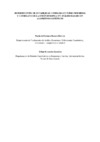Identificador persistente para citar o vincular este elemento:
https://accedacris.ulpgc.es/jspui/handle/10553/40276
| Título: | Determinantes de estabilidad cambiaria en países miembros y candidatos de la Unión Europea: un análisis basado en algoritmos genéticos | Otros títulos: | Factors determining exchange rate stability in member and candidate States of the European Union: an analysis based on genetic algorithms | Autores/as: | Ramos-Herrera, M. D. C. Acosta González, Eduardo |
Clasificación UNESCO: | 53 Ciencias económicas | Palabras clave: | De facto fixed exchange rate systems Exchange crisis Genetic algorithms Crisis cambiaria Algoritmos genéticos, et al. |
Fecha de publicación: | 2017 | Publicación seriada: | Cuadernos de Economía | Resumen: | En este trabajo se investiga cuáles son los principales factores determinantes que condicionan la probabilidad de que un país decida adoptar y mantener un sistema cambiario fijo de facto analizando 17 economías que forman parte de la Unión Europea. Como medida de robustez se consideran 3 alternativas de la variable objeto de estudio, al igual que se contrasta la sensibilidad de los resultados obtenidos ante diferentes procesos de formación de expectativas. A través de la metodología de algoritmos genéticos se examina un amplio conjunto de variables explicativas basadas en los modelos de primera, segunda, tercera y cuarta generación, añadiendo además variables de naturaleza política, de confianza, de expectativas e institucionales, con la finalidad de evaluar si mejora la capacidad explicativa de la estabilidad cambiaria. Entre los factores de mayor repercusión destaca claramente el grupo de las variables que miden la competitividad, tanto por su repetida presencia en los diferentes modelos como por su poder explicativo. Dentro de este grupo, muestra especial relevancia el tipo de cambio real, así como el índice de precios al consumo armonizado del país de referencia, que en nuestro caso se corresponde con la Zona Euro. Otras variables que destacan, pero en menor medida, son el agregado monetario M1, la paridad central, la confianza en las instituciones europeas, las expectativas de los agentes, la ideología parlamentaria y la libertad de los derechos políticos. In this work, a study is made on the main factors that can determine the possibility that a country decides to adopt and maintain a de facto fixed exchange rate system, by analysing the economies of 17 countries from the European Union. As a measure of robustness, three alternatives of study variable were considered, as well as contrasting the sensitivity of the results obtained using different forecasting models. Using this methodology of genetic algorithms, a large group of explanatory variables is examined based on first, second, third, and fourth generation models. Added to these, were variables of a political nature, confidence, expectations, and institutional nature, with the aim of evaluating if it improves the explanatory capacity of exchange rate stability. Among the higher impact factors, the group of variables that measure competiveness clearly stand out, due to their repeated presence in the different models, as well as due to their predictive power. Within this group, true exchange rate shows special significance, as well the harmonised consumer price index of the country of reference, which in our case is the Eurozone. Other variables highlighted but to a lesser extent are, the M1 monetary aggregate, central parity, the confidence in the European institutions, the expectations of the agents, parliamentary ideology, and the freedom of political rights. |
URI: | https://accedacris.ulpgc.es/handle/10553/40276 | ISSN: | 0210-0266 | DOI: | 10.1016/j.cesjef.2015.12.002 | Fuente: | Cuadernos de Economía [ISSN 0210-0266], v. 40 (112), p. 68-82 |
| Colección: | Artículos |
Citas SCOPUSTM
2
actualizado el 08-jun-2025
Citas de WEB OF SCIENCETM
Citations
2
actualizado el 08-feb-2026
Visitas
348
actualizado el 16-ene-2026
Descargas
43
actualizado el 16-ene-2026
Google ScholarTM
Verifica
Altmetric
Comparte
Exporta metadatos
Los elementos en ULPGC accedaCRIS están protegidos por derechos de autor con todos los derechos reservados, a menos que se indique lo contrario.
